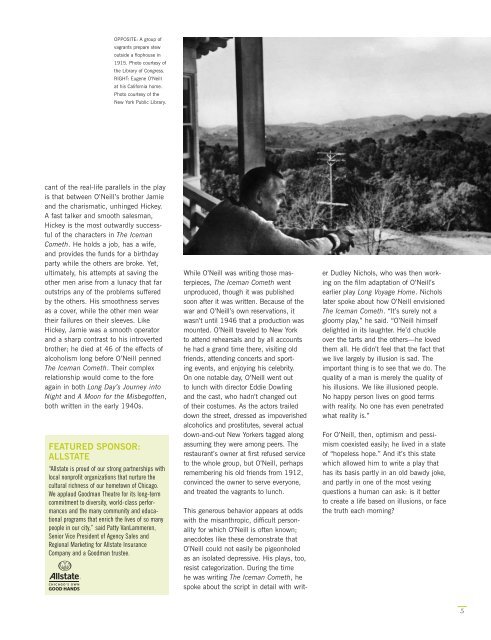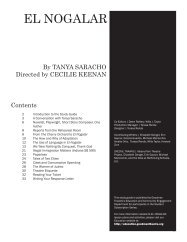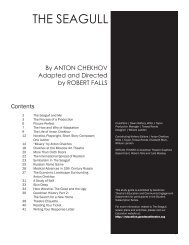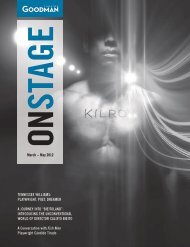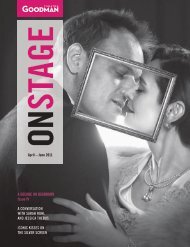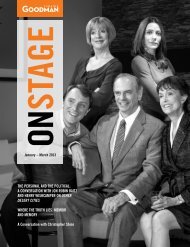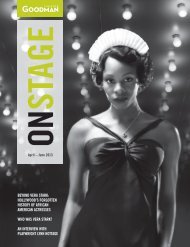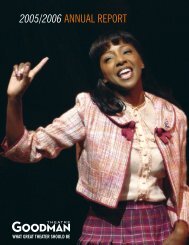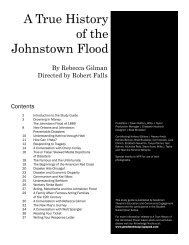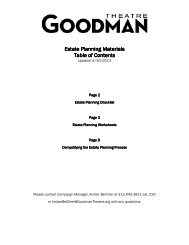A HOPELESS HOPE: EUGENE O'NEILL AND ... - Goodman Theatre
A HOPELESS HOPE: EUGENE O'NEILL AND ... - Goodman Theatre
A HOPELESS HOPE: EUGENE O'NEILL AND ... - Goodman Theatre
You also want an ePaper? Increase the reach of your titles
YUMPU automatically turns print PDFs into web optimized ePapers that Google loves.
OPPOSITE: A group of<br />
vagrants prepare stew<br />
outside a flophouse in<br />
1915. Photo courtesy of<br />
the Library of Congress.<br />
RIGHT: Eugene O’Neill<br />
at his California home.<br />
Photo courtesy of the<br />
New York Public Library.<br />
cant of the real-life parallels in the play<br />
is that between O’Neill’s brother Jamie<br />
and the charismatic, unhinged Hickey.<br />
A fast talker and smooth salesman,<br />
Hickey is the most outwardly successful<br />
of the characters in The Iceman<br />
Cometh. He holds a job, has a wife,<br />
and provides the funds for a birthday<br />
party while the others are broke. Yet,<br />
ultimately, his attempts at saving the<br />
other men arise from a lunacy that far<br />
outstrips any of the problems suffered<br />
by the others. His smoothness serves<br />
as a cover, while the other men wear<br />
their failures on their sleeves. Like<br />
Hickey, Jamie was a smooth operator<br />
and a sharp contrast to his introverted<br />
brother; he died at 46 of the effects of<br />
alcoholism long before O’Neill penned<br />
The Iceman Cometh. Their complex<br />
relationship would come to the fore<br />
again in both Long Day’s Journey into<br />
Night and A Moon for the Misbegotten,<br />
both written in the early 1940s.<br />
FEATURED SPONSOR:<br />
ALLSTATE<br />
“Allstate is proud of our strong partnerships with<br />
local nonprofit organizations that nurture the<br />
cultural richness of our hometown of Chicago.<br />
We applaud <strong>Goodman</strong> <strong>Theatre</strong> for its long-term<br />
commitment to diversity, world-class performances<br />
and the many community and educational<br />
programs that enrich the lives of so many<br />
people in our city,” said Patty VanLammeren,<br />
Senior Vice President of Agency Sales and<br />
Regional Marketing for Allstate Insurance<br />
Company and a <strong>Goodman</strong> trustee.<br />
While O’Neill was writing those masterpieces,<br />
The Iceman Cometh went<br />
unproduced, though it was published<br />
soon after it was written. Because of the<br />
war and O’Neill’s own reservations, it<br />
wasn’t until 1946 that a production was<br />
mounted. O’Neill traveled to New York<br />
to attend rehearsals and by all accounts<br />
he had a grand time there, visiting old<br />
friends, attending concerts and sporting<br />
events, and enjoying his celebrity.<br />
On one notable day, O’Neill went out<br />
to lunch with director Eddie Dowling<br />
and the cast, who hadn’t changed out<br />
of their costumes. As the actors trailed<br />
down the street, dressed as impoverished<br />
alcoholics and prostitutes, several actual<br />
down-and-out New Yorkers tagged along<br />
assuming they were among peers. The<br />
restaurant’s owner at first refused service<br />
to the whole group, but O’Neill, perhaps<br />
remembering his old friends from 1912,<br />
convinced the owner to serve everyone,<br />
and treated the vagrants to lunch.<br />
This generous behavior appears at odds<br />
with the misanthropic, difficult personality<br />
for which O’Neill is often known;<br />
anecdotes like these demonstrate that<br />
O’Neill could not easily be pigeonholed<br />
as an isolated depressive. His plays, too,<br />
resist categorization. During the time<br />
he was writing The Iceman Cometh, he<br />
spoke about the script in detail with writer<br />
Dudley Nichols, who was then working<br />
on the film adaptation of O’Neill’s<br />
earlier play Long Voyage Home. Nichols<br />
later spoke about how O’Neill envisioned<br />
The Iceman Cometh. “It’s surely not a<br />
gloomy play,” he said. “O’Neill himself<br />
delighted in its laughter. He’d chuckle<br />
over the tarts and the others—he loved<br />
them all. He didn’t feel that the fact that<br />
we live largely by illusion is sad. The<br />
important thing is to see that we do. The<br />
quality of a man is merely the quality of<br />
his illusions. We like illusioned people.<br />
No happy person lives on good terms<br />
with reality. No one has even penetrated<br />
what reality is.”<br />
For O’Neill, then, optimism and pessimism<br />
coexisted easily; he lived in a state<br />
of “hopeless hope.” And it’s this state<br />
which allowed him to write a play that<br />
has its basis partly in an old bawdy joke,<br />
and partly in one of the most vexing<br />
questions a human can ask: is it better<br />
to create a life based on illusions, or face<br />
the truth each morning?<br />
5


